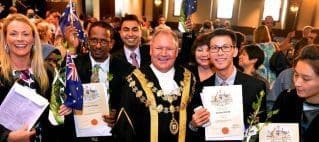The new Global Talent Independent (GTI) visa provides a direct permanent residence for ‘highly skilled professionals in high growth sectors’. Processing times range between two days and two months According to the Department of Home Affairs with many visas being decided within a week or two.
GTI Industries
The GTI targets the following ‘high growth’ areas:
- Agricultural Technology (AgTech)
- Financial Technology (FinTech
- Medical Technology (MedTech)
- Cyber Security
- Energy and Mining Technology
- Space and Advanced Manufacturing
- Quantum Information/Advance Digital/Data Science and ICT
GTI requirements
GTI requirements seem to be quite simple:
- Applicants must have the ‘ability to attract’ a salary at or above the Fair Work High Income Salary Threshold which is currently around $148,700 and
- be ‘endorsed’ by a nominator who has a national reputation in the same field as the potential applicant (FORM 1000)
- health assessment
- character assessment
GTI visa for recent graduates
The Australian Government is actively encouraging people who have:
- completed a Doctoral degree (PhD) in the last 3 years, or are submitting their thesis in the next 6 months; or
- completed a Bachelor Honours degree or Masters degree in the last 3 years, and have an overall grade-point average of 80 (or above) out of 100
to consider applying for a Distinguished Talent visa. These graduates/students would also be eligible to receive the highest visa processing priority under Direction 85 if their studies were in one of the seven priority sectors and they can demonstrate a current or future annual salary equivalent to or higher than the FWHIT.
The rationale for the direction is to give priority to applicants viewed as ‘highly desirable’ because of their skills and knowledge in sectors identified by the Australian Government as a priority for future industry growth, and with emerging opportunities for Australia’s economy. These sectors have been highlighted as priorities through the Industry Growth Centre initiative and through targeted consultation with key industry stakeholders including Austrade; Department of Industry, Innovation and Science; Department of Employment, Skills, Small and Family Business; and academia.
Masters degree or Bachelor Honours degree graduates must have an overall grade-point average of 80 (or above) out of 100 if they are relying on these academic qualifications as the sole basis for demonstrating a record of exceptional and outstanding achievement. This requirement does not apply to PhD students.
Achievements by a PhD student/graduate, Masters degree or Bachelor Honours degree graduate will be considered internationally recognized if:
- their research is of international interest and significance; or
- their research would be relevant to an international audience; or
- they have presented their research at international forums; or
- their research could be used to inform academia, governments, and industry abroad; or
- their research is relevant to Australian academia, governments, and industry in respect to advancing Australia’s international competitiveness; or
- their research highlights the potential for innovation and productivity increases for Australian organizations and industries operating in an international or globalized context; and
- they have achieved a grade-point average of 80 (or above) out of 100 if they are a Masters degree or Bachelor Honours degree graduate.
GTI as an alternative to ENS
Please note it is said that an applicant must have the ‘ability to attract’ salary, not earn above FWHIT. Many of the applicants who got this visa did not earn that much at the time of application.
Companies in these sectors who are willing to help their employees to gain a permanent residency ion Australia may consider GTI as an alternative to ENS visa.
There is no legal requirement for the employer to actually pay the $148,700 salary. In fact, the employer does not even have to employ the nominated migrant.
The employer also doesn’t need to have a demonstrated record of training Australians or to make any payment to the Skilling Australia Fund.
As there is no nominated ‘position’ to be filled, the nominating employer does not need to test the labor market.
There is no legal requirement for the applicant to undergo a formal skills assessment or undertake an English language test. The applicant can be of any age.
GTI visa types
All of this is possible because the GTI program operates within the framework of the long-standing Distinguished Talent visa which provides decision-makers with extensive discretion. There are 2 visa types applicants may apply for
- Subclass 858 Distinguished Talent Visa (Onshore)
- Subclass 124 Distinguished Talent Visa (Offshore)
Call us or book a consultation with our agent if you want to discuss your eligibility for a GTI visa.



